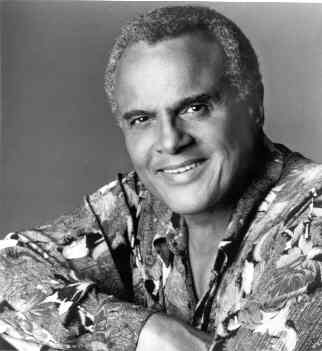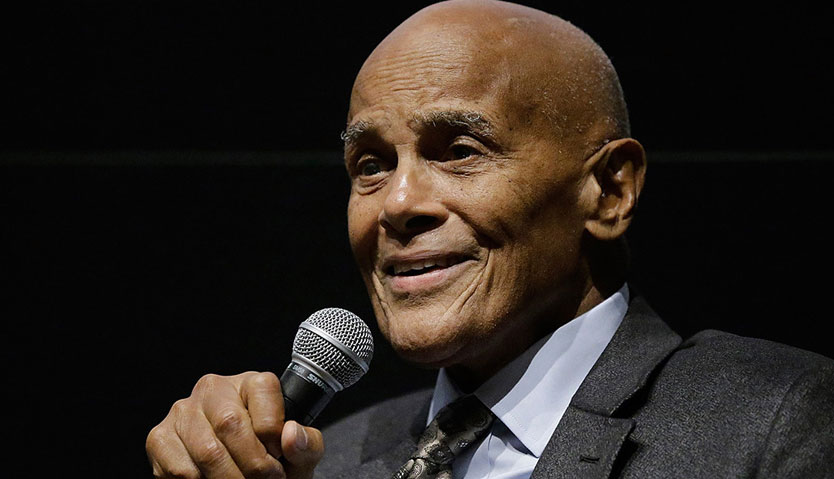Iconic Singer, Actor, and Human Rights Activist Harry Belafonte Passes Away at 96

Harry Belafonte, the legendary singer, actor, and civil rights activist, died on Tuesday at the age of 96 due to congestive heart failure. Belafonte’s artistry and activism transcended racial barriers and touched the hearts of people around the world. He was an EGOT winner, having won Emmy, Grammy, Oscar, and Tony awards, and passed away at his New York home, as confirmed by his publicist.
Belafonte’s music and performances were characterized by style, class, and charisma. His recordings for RCA Victor in the 1950s, including his famous rendition of the Jamaican folk song “Day-O” (also known as “The Banana Boat Song”), sparked a craze for calypso music. With his good looks and unbuttoned shirt revealing his chest, Belafonte was adored by both black and white audiences at a time when America was still deeply segregated.
Family, Birth, and Childhood
Belafonte was born in Harlem to parents from the Caribbean. His mother was Jamaican, and his father was from Martinique. He spent his early childhood in Jamaica, where he absorbed the island’s rich culture. He told NPR in 2011 that “The Banana Boat Song” was inspired by the vendors he heard singing in the streets. The song’s lyrics tell the story of underpaid workers begging for an honest count of their labor. The album Calypso, featuring the song, became a bestseller, topping Billboard’s newly created album charts for several weeks in 1956.
Belafonte dropped out of high school and joined the Navy before pursuing acting and music. He trained at the American Negro Theatre alongside Sidney Poitier and Ruby Dee and started performing in clubs before securing a recording contract. In 1954, he won a Tony Award for his work in “John Murray Anderson’s Almanac: A Musical Harlequinade.” He starred in movies and TV shows and hosted The Revlon Revue: Tonight with Belafonte, a groundbreaking program that featured both black and white performers and won an Emmy Award.
Belafonte was one of Dr. Martin Luther King Jr.’s closest friends and was instrumental in organizing the Freedom March on Washington in 1963, where King delivered his iconic “I Have A Dream” speech. He used his knowledge of media and celebrity to ensure that the march was covered by the press, and he helped to raise funds to bail King out of jail in Birmingham. Coretta Scott King wrote in her autobiography that “Harry has always come to our aid, his generous heart wide-open.”
Belafonte’s humanitarian work earned him numerous accolades throughout his career. He was an outspoken critic of people in power, including President Barack Obama, whom he once chastised for not doing enough for the poor. He also called out African American artists Jay-Z and Beyonce for their lack of social responsibility. Despite these controversies, Belafonte remained a beloved figure, and his legacy as a trailblazer in the arts and civil rights will be forever remembered.
Harry Belafonte: A Pioneer in Music and Activism
Harry Belafonte was a trailblazer in the music industry, breaking down racial barriers and paving the way for future generations of Black musicians. He was a consummate performer, known for his style, class, and charisma. His iconic recordings, including “The Banana Boat Song,” remain beloved to this day.
Belafonte’s contributions to civil rights activism were equally significant. He was a close friend of Dr. Martin Luther King Jr. and helped organize the Freedom March on Washington in 1963. He used his knowledge of media and celebrity to ensure that the march was covered
The Legacy of Harry Belafonte: Breaking Barriers and Balancing Activism with Artistry
On Tuesday, April 19, the world lost a true icon of music, film, and human rights activism. Harry Belafonte, who passed away at the age of 96, left behind a legacy that will be remembered for generations to come. He broke racial barriers, brought global attention to the struggle for civil rights, and used his artistry to inspire change and promote social justice.
Master of Style, Class, and Charisma

One of Belafonte’s most enduring legacies is his incredible talent as a performer. In the 1950s, he became one of the most popular recording artists in the world, with his recordings for RCA Victor setting off a craze for calypso music. His iconic version of “Day-O” (also known as “The Banana Boat Song”) became a smash hit, and his good looks and effortless charisma made him a beloved figure in the eyes of audiences, both black and white.
But Belafonte’s artistry was more than just entertainment. His music was infused with a deep sense of cultural heritage and political consciousness, and his work often addressed themes of social justice, freedom, and human dignity. This balance between activism and artistry would come to define Belafonte’s career, and would earn him accolades across the entertainment industry.
From Harlem to Hollywood
Belafonte’s journey to becoming an international superstar began in the heart of Harlem, where he was born to Caribbean parents. His mother was Jamaican, and his father was from the island of Martinique. Growing up, he absorbed the culture of his mother’s native Jamaica, which would later become a defining influence on his music.
After dropping out of high school and serving in the Navy during World War II, Belafonte returned to New York and began training as an actor at the American Negro Theatre. It was here that he first discovered his passion for performing, and he quickly became one of the most talented and versatile actors in the theater’s ensemble.
But it was Belafonte’s singing that truly set him apart. He began performing in clubs around New York, and soon caught the attention of RCA Victor, who signed him to a recording contract. His first album, “Calypso,” became a bestseller, and he followed it up with a string of hit singles and albums throughout the 1950s and 60s.
A Champion of Civil Rights
Belafonte’s success as a performer allowed him to become a powerful advocate for social justice and civil rights. He was one of Dr. Martin Luther King Jr.’s most trusted friends, and he played a key role in organizing the Freedom March on Washington in 1963, where King delivered his iconic “I Have A Dream” speech.
Belafonte understood the power of media in promoting social change, and he worked tirelessly to use his influence to raise awareness about the struggle for civil rights. He was instrumental in assembling a “celebrity delegation” of Hollywood stars and performing artists for the march on Washington, and he strategically placed them in a way that would ensure they were captured by television cameras.
Belafonte’s activism extended beyond his work with Dr. King. He was a vocal opponent of the Vietnam War, and he used his platform as an entertainer to raise awareness about issues of poverty, injustice, and inequality. He was a frequent critic of people in power, including President Barack Obama, whom he once chastised for not showing enough concern for the poor.
A Legacy that Lives On
Belafonte’s life and legacy are a testament to the power of artistry and activism to effect real change in the world. He was a man of remarkable talent, but also incredible courage
After the success of his show, Belafonte was approached by Revlon for a second season, but he refused to make it all-Black, as he believed in racial integration. Belafonte also used his platform to address political and social issues. He was one of Dr. Martin Luther King Jr.’s closest friends and a prominent figure in the civil rights movement.
In 1963, Belafonte helped organize the historic March on Washington, where Dr. King delivered his iconic “I Have a Dream” speech. Belafonte also played a significant role in helping to raise funds for the movement and bailed Dr. King out of jail when he was arrested during a demonstration in Birmingham, Alabama.
Belafonte’s activism was not limited to the United States. He was also an advocate for human rights around the world, and he used his celebrity status to bring attention to causes such as anti-apartheid efforts in South Africa and the fight against hunger in Ethiopia. Belafonte also helped to organize Nelson Mandela’s first visit to the United States after his release from prison.
Belafonte’s artistic contributions were just as significant as his activism. He was a successful singer, actor, and producer, and he received numerous awards for his work. In 1953, he won a Tony Award for performing in “John Murray Anderson’s Almanac: A Musical Harlequinade.” He also won three Grammy Awards, including a Lifetime Achievement Award, and an Emmy Award for his television specials. In 1985, he received an Oscar for his humanitarian work, and in 1994, he was awarded the National Medal of Arts by President Bill Clinton.
Belafonte was also an accomplished actor, appearing in movies such as “Carmen Jones” and “Island in the Sun.” He was a regular on television variety shows and hosted his own specials, including “Harry Belafonte: Sing Your Song,” which premiered at the Sundance Film Festival in 2011.
In addition to his many awards and accolades, Belafonte’s contributions to the arts and activism have left a lasting impact on society. He paved the way for future generations of Black artists and activists and helped to shape the cultural landscape of the United States and the world. Belafonte’s legacy as an artist and activist will continue to inspire and educate for generations to come.
